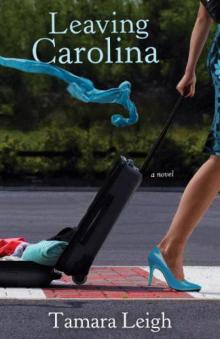- Home
- Tamara Leigh
LAWLESS: A Medieval Romance (AGE OF CONQUEST Book 7) Page 14
LAWLESS: A Medieval Romance (AGE OF CONQUEST Book 7) Read online
Page 14
“Heed you how?”
“Whatever little conscience you possess that caused you to rebuke your companion, you would do well to expand its reach.”
The chevalier set his small head to the side. “Do you threaten me?”
“A threat is where this begins, but not where it ends if you speak what pleases Taillebois rather than nurture that bit of conscience. Truth, Sir Roul, is what I require when our king calls the lady to account for injuring a Norman—more, it is what the Lord requires.”
The chevalier narrowed his eyes. “A dangerous thing to have a care for an enemy of William the Great. Though many a man might forgive you were she beautiful in the belief you are bewitched, for as ordinary as the lady is, your loyalties could be questioned.”
Guy knew it, but just as he had not taken the opportunity to abduct King Malcolm’s betrothed, neither could he do the wrong thing here. Even if only one more atrocity among the many could be averted, he would not stand by. “Will you do what is right, Sir Roul?”
“Would you believe me if I agreed?”
“Certes, greater doubt I would have about the word you give than you should have about mine that it will not go well for you if you do not speak in truth.”
The chevalier breathed deep. “If I am summoned by our king, I will speak what is best for me—not my commander, not you, not the lady. Now unless you would attempt to see more of my blood spilled this night, I shall seek my pallet.”
Knowing short of slaying him and beyond prayer no more could be done to aid the lady, Guy said, “This night you are safe.”
Sir Roul skirted him, a moment later halted and looked around. “As you ought know by now, in this England, there is no room for Saxon sympathizers, Sir Guy. Sleep light.”
Chapter Fourteen
Summoned again, and this time she was surprised as she ought not be it was the squire who came for her. And disappointed, certain Guy had returned to the Fens.
Once again entirely at the mercy of my enemies, Vilda thought as she stepped into the corridor where the young man had retreated while she added the tunic to her gown and fashioned two braids.
As she followed him, she revisited the hope that since it was past the breaking of fast, there would be no great audience to witness her punishment, especially were she permitted to defend her behavior of the night past. Though Le Bâtard might not allow her to speak on her own behalf and pride discouraged her from doing so, she was prepared to tell what had stuck in her throat when the chevalier escorted her abovestairs.
In anticipation of this day’s summoning, her whispers in the dark had kept her awake, each version of her account shortened and better worded to more easily be told. Providing she could make herself heard, which seemed less likely if Sir Roul was present, she might avoid being manacled again and tossed in a cell.
Heard and believed, she amended. Of course there was a greater obstacle—that what had happened that day mattered in the least to Le Bâtard.
Though encouraged by how few voices drifted up from the hall as she descended the stairs, nervously she smoothed the belted tunic over the gown whose skirt was much fuller, causing it to pleat calves to feet.
When she stepped into the hall and the squire motioned her forward, she looked to the left and saw only the steward at the high table, a journal before him, quill in hand.
Relieved she was not to present before the dais with the usurper peering down at her, Vilda shifted her gaze to the hearth and saw not only was her audience smaller than hoped, but Sir Roul was absent. Of further relief, Guy stood to the side with his back to the fire, his great arms crossed over his chest.
Whereas his king ignored her where he sat at a small table examining chess pieces on a board between De Warenne and him, the chevalier acknowledged her with a nod. He was muddied the same as nearly all in attendance, confirming it was a hunt that roused her after dawn.
Her chamber positioned such that her narrow window afforded little view of the bailey before the manor, she had guessed the sounds of horses, hounds, and men calling to one another were those that preceded a hunt. A good guess that could bode well for her since often the sport of putting meat on the table left men in a generous mood.
Vilda was halfway across the hall when the usurper thrust one of his pieces across the board, causing it to collide with one of his opponent’s which clattered to the floor near the hearth.
Sitting back and folding his hands over his abdomen, he jutted his chin. “Your game improves, De Warenne, and though the final moves are yet to be made, you have lost. As previously warned, do you limit your thinking to only a few moves ahead, never will you master the game of kings.”
The man raised both hands. “Hence, why you are king and I am not.”
As Vilda did not know De Warenne, she could not be certain, but she thought she heard falsity in his tone, and it made her wonder if his lack of mastery was feigned. Even in mere games of war, the one who wielded the most power was expected to prevail.
Recalling when Le Bâtard had asked if she played chess, she almost wished the opportunity to move her pieces against his. Possibly hers would be trounced, but her loss would not be feigned.
“True, true, De Warenne,” Le Bâtard said and looked to Vilda.
Realizing she had halted and refusing to scamper forward, she remained unmoving.
“You took your time.” He flapped a hand. “Come.”
She had not taken her time, departing her chamber ten minutes after the squire came for her. But she would not argue. With measured steps that were not so slow as to appear fearful, she glanced at Guy and halted just out of reach of his king. “You wish to speak with me?”
He put his head to the side. “As displeased as I am with you, Alvilda, and as aware of it as you must be, do you not think it wise to afford me my title?”
“I do, but though it would go better for me to behave a vassal who has learned to wear a face not his own lest his liege disapprove of his real face, those moves elude me.” Seeing understanding in his eyes, fairly certain if she looked to De Warenne it would be in his as well, she added, “Had I much to lose, more receptive I would be, but I have only myself now.”
His mouth curved. “You have only yourself now, but when I take Ely, more you will have to lose. Then I expect you to eagerly bend the knee in the hope of gaining mercy for the wretches who survive.”
Resisting a swallow sure to be heard, she inclined her head. “If you prevail against Hereward, that I shall do.”
“I am sure you will make it worth the wait.” He settled more deeply in his chair. “Last eve, having been afforded the honor of dining with your king, you did injury to a chevalier who serves the Sheriff of Lincolnshire.”
I am ready for this, she assured herself. “As told then, I tell again—he did me great injury.”
“I understand he but tried to quiet those who spoke ill of your cousin in your hearing. So what injury that?”
Wishing she could look upon Guy without drawing attention, she said, “I am grateful you ask rather than blindly accept what was told you.”
Le Bâtard shrugged his mouth. “Dare not think it to your advantage. I am a man whose curiosity must be scratched, especially when I am bored, and that I am in danger of becoming while awaiting plans to end the resistance’s stand to come together.”
The second causeway, she thought and silently entreated, Lord, let it also fail.
“So scratch, Alvilda. What injury did Sir Roul do you?”
She moved her gaze over all standing near the hearth—two chevaliers she did not know though one might be he whose words sought to offend on the night past, Ivo Taillebois whose hatred was better seen this day, the priest who had blessed the meal and now covered a yawn with a hand, Guy whom she longed to linger over, De Warenne whose gaze reflected amusement as he fingered a rook that might have shifted the game in his favor, Le Bâtard who raised his eyebrows higher, and two she guessed were his personal guard.
She breathed de
ep. “Sir Roul’s great injury was inflicted four years past.”
“Four years!” the usurper exclaimed. “You water well your grudges, Alvilda.”
Nails in her palms alerting her to fists, she started to ease her hands, but when his eyes shifted to them she could not bring herself to splay them guiltily. “It is far more than a grudge.”
He returned his gaze to hers.
Tell it as rehearsed, she counseled. Stay true to that last version and you will neither fold nor rage.
She cleared her throat. “On the day spring turned summer in the year of our Lord 1067, eight months after Normans slew our king and our greatest defenders, I wed a man chosen by my grandsire—a thane injured during the battle with Norwegians ere that of Hastings. After vows were spoken, all sat down to a feast mostly that in name only since our losses to the invasion were great. As cups were filled and platters passed around, Sir Roul and his men arrived and demanded your tribute that was required for my husband to retain lands long held by his family. When that chevalier was told the coffers were empty but for a few coins—”
“Hold!” The usurper raised a hand. “Methinks it right Sir Roul face his accuser so he may give answer immediately if I deem any is needed. Too, sooner you may apologize for the ill done him.”
Inwardly, she seethed. Outwardly, she closed her mouth. She had been as prepared as possible to confront her persecutor, but having been so relieved to find him absent from the hall, it was cruel to have him sprung upon her. Fortunately, in the time it took to summon him, she could calm herself enough to dispassionately defend her actions.
“Sir Roul!” Le Bâtard called.
Sidelong, she saw someone step forward, and when she looked that direction, discovered the chevalier had lurked in an alcove.
The games these Normans play! she seethed anew. And such anger when their foes retaliate with games of their own!
When the eyes in a face she had not looked upon last eve met hers, her soul felt as if hung with a great stone and flung into muddied water the same as Theta. And as he strode toward his liege, anticipation of a mocking smile made her drive her nails into her palms. However, the man whose head was not bandaged as it ought to be to emphasize the violence committed against him did not smile. His face was impassive, and yet when he halted near the usurper, he looked momentarily away as if discomfited by her stare.
So unexpected was that, she considered she had mistakenly identified him. But it was him, though she questioned her memory again when he said respectfully, “Lady Alvilda.”
“Norman gentility, esteemed the world over,” the usurper boasted.
It was difficult not to laugh. More than that she did not believe the chevalier’s sincerity, she marveled Le Bâtard spoke such to one who was to give an account of Norman barbarism.
“You may continue, Alvilda.”
Seeking to return to the path off which she had been yanked, she became aware of the thrum of her heart and perspiration on the back of her neck.
“We wait,” he prompted.
Determined not to be hurried lest she was discomposed further, she recalled her last words. “When Sir Roul was told the coffers were empty but for a few coins, he named my husband a liar and ordered his men to search the manor. While we were held under threat of blades, they did so and most destructively. When the coffers proved nearly barren and naught else of good value was found, this Norman ordered my husband beaten until he revealed his hidden riches.”
“That is the task with which such men were charged—to collect the tribute of those who wished to keep possession of their lands under my rule,” the usurper said. “If your husband did not have those funds, he should have quit the property ere my agents arrived.”
She longed to argue that just because he had made himself King of England did not mean he owned what belonged to the conquered, but it would be a waste and could cause her to forget her place in the story.
“The man I wed was a warrior,” she continued, “and when he was aggressed upon, acted one, fending off attacks with his bare hands. After beating one Norman, he took from another his blade, held it to that one’s throat, and commanded the trespassers to leave his home. That was when they dragged me before him. To preserve my life, he yielded the sword and was put through.”
Pushing past memories of his blood flecking her, she continued, “It did not end there, and Sir Roul let happen what happened to people you claimed were now your own. Ten more of our menfolk were gutted, and as they lay dead and dying on the floor of the hall, the weary trespassers called for food and drink.”
Throat and eyes aching from the strain of withholding tears and keeping her gaze fixed on Le Bâtard so they not stray to Guy, she swallowed. “Though the bride was made a widow the same day she wed, alongside her servants she was forced to pour drink for murderers.”
Again, she paused, this time over the realization she spoke as if it happened to another. Those words were not rehearsed, but since they were something of a shield, she continued to hold it before her. “The widowed bride hoped it was but the worst of dreams, but it was not yet that. What followed could turn a good man evil if those things happened to women under his protection. You must know I speak of the sin of ravishment.”
“You claim that you, a noblewoman, were violated?” Le Bâtard asked.
As this was not the order of her rehearsed tale, and his question more deeply colored memories she wished to remain muted, she ignored it. “The first ravished was one of beauty—my maid who was still more girl than woman.” She nodded at Sir Roul. “He ruined her, then his men set to ruining other servants.”
“You escaped such attentions?” he asked as if, had he any concern, it was for one of nobility.
Deciding she need not speak what next she had intended, she said, “Many the godless Normans who have little care for how high-born or comely the woman of whom they make spoils. Thus, it was an aged dagger slipped to me by a kitchen lad that saved me from the attentions of Sir Roul’s man.”
“You slew him?”
Offended by what was surely greater concern for a Norman, further she elevated her chin. “I should have, and I wanted to stick a blade in my enemy, but I hesitated.” She nearly looked to Guy to verify he understood what previously she had revealed. “For it—”
“Were you or were you not violated?” persisted the man who stole England.
More greatly hating him, she snapped, “As it was true then, it is true now. I am sturdy as God made me. I am a widow as Sir Roul made me. I am a maiden though his man sought to steal that from me.” She moistened her lips. “Because I did not do what I should have, another paid the price for my hesitation. Had I put that blade in your foul countryman, only he would have died. Instead, my grandsire met his end in fighting off my attacker. When the Norman put a blade in him, with the last of his strength, he broke the man’s neck and told me to run. That I did and found refuge with rebels who later allied with my cousin.”
It is done, Vilda told herself, and not one hot tear fell.
Opening her hands at her sides, she held her gaze to Le Bâtard’s to await his accusation she lied or declaration that in times of war such things happened, but he stared, things unknown flitting across his eyes that alternately deepened and eased the lines of his face.
Catching movement from Sir Roul who had made a widow of her and spoils of those of her household, she realized there was one more thing to be said. “Now, Duke of Normandy, if still you think I ought to beg forgiveness of your liegeman, threaten me again and prove you would be well were your own wife told to apologize to a Saxon who did to her what was done to me and mine.”
“Though much you call to mind my Matilda, you overstep,” he growled.
“Would she not were she made to stand before my king and tell what befell her household—your household—that was overrun by invaders?”
Slowly, he sat forward and clasped his hands. “That was a moving tale. If it is true, it is regrettable such ill befell th
e wedding party, but methinks my man will refute it, and who am I to believe? One loyal to me or one greatly disloyal?” He looked to that Norman. “Speak, Sir Roul, and let us be done with this so sooner your accuser can make restitution.”
I detest you, Vilda thought, then shifted her gaze to the chevalier. And you as well.
This time he did not avert his eyes. “My liege, earlier that day whilst riding between demesnes collecting your tribute, rebels set upon us and slew three of my men without loss of their own. Thus, we were greatly roused when we arrived at the next estate and found a wedding feast in progress and no tribute. It is true the manor was searched. It is true much destruction was wrought.”
Vilda startled but immediately reminded herself it was only two truths among the numerous lies to follow.
“It is true I ordered the lady’s husband beaten to persuade him to reveal what was hidden. It is true he resisted and was slain.”
She stopped breathing.
“And as told, it is true what followed—I did what I should not have and allowed my men the same.”
Hearing a grunt, Vilda looked to Taillebois and saw his color was high, teeth bared.
“Thus, though I wish I could refute the lady’s account, as the priest who received my confession last eve can attest, it would be a lie.”
Sway in her legs, Vilda stepped her feet apart and shifted her regard to the priest who nodded. Tears threatening to overflow, she looked again to Sir Roul.
“None need tell me what we did was ignoble,” he said. “Daily the Lord reminds me of our sins, I acknowledge them and repent, and monthly I mortify my flesh.” He jerked at his belt, let fall that which was hung with sword, dagger, and purse, and drew tunic and undertunic over his head.
“Almighty!” the usurper muttered, and she understood when the back turned to him was shown her. Numerous thin lines striped it, evidencing a whip had been snapped over a shoulder. All were healed except those recently gained.

 FEARLESS: Book Two: Age of Conquest
FEARLESS: Book Two: Age of Conquest BOUNDLESS: A Medieval Romance (AGE OF CONQUEST Book 6)
BOUNDLESS: A Medieval Romance (AGE OF CONQUEST Book 6) Lady Betrayed
Lady Betrayed Merciless
Merciless Nowhere, Carolina
Nowhere, Carolina Virgin Bride
Virgin Bride Blackheart
Blackheart Restless in Carolina
Restless in Carolina THE AWAKENING_A Medieval Romance
THE AWAKENING_A Medieval Romance Baron of Blackwood
Baron of Blackwood Leaving Carolina
Leaving Carolina HEARTLESS: A Medieval Romance (Age of Conquest Book 4)
HEARTLESS: A Medieval Romance (Age of Conquest Book 4) Baron of Godsmere
Baron of Godsmere Lady Of Eve
Lady Of Eve LAWLESS: A Medieval Romance (AGE OF CONQUEST Book 7)
LAWLESS: A Medieval Romance (AGE OF CONQUEST Book 7) Lady Of Fire AKA Pagan Bride
Lady Of Fire AKA Pagan Bride The Yielding (Age of Faith)
The Yielding (Age of Faith) The Redeeming: Book Three (Age of Faith)
The Redeeming: Book Three (Age of Faith) LADY UNDAUNTED: A Medieval Romance
LADY UNDAUNTED: A Medieval Romance THE RAVELING: A Medieval Romance (Age of Faith Book 8)
THE RAVELING: A Medieval Romance (Age of Faith Book 8) LADY EVER AFTER: A Medieval Time Travel Romance (Beyond Time Book 2)
LADY EVER AFTER: A Medieval Time Travel Romance (Beyond Time Book 2) Dreamspell
Dreamspell The Unveiling (Age of Faith)
The Unveiling (Age of Faith) THE RAVELING
THE RAVELING Splitting Harriet
Splitting Harriet Age of Faith 4 - The Kindling
Age of Faith 4 - The Kindling THE RAVELING_A Medieval Romance
THE RAVELING_A Medieval Romance Perfecting Kate
Perfecting Kate Misbegotten
Misbegotten THE VEXING: A Medieval Romance (AGE OF FAITH Book 6)
THE VEXING: A Medieval Romance (AGE OF FAITH Book 6) LadyOfConquest:SaxonBride
LadyOfConquest:SaxonBride